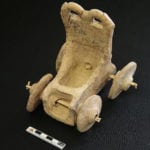 Miscellaneous
Miscellaneous  Miscellaneous
Miscellaneous  Politics
Politics 10 Lesser-Known Far-Right Groups of the 21st Century
 History
History Ten Revealing Facts about Daily Domestic Life in the Old West
 Weird Stuff
Weird Stuff 10 Everyday Products Surprisingly Made by Inmates
 Movies and TV
Movies and TV 10 Actors Dragged out of Retirement for One Key Role
 Creepy
Creepy 10 Lesser-Known Shapeshifter Legends from Around the World
 Animals
Animals 10 Amazing Animal Tales from the Ancient World
 Gaming
Gaming 10 Game Characters Everyone Hated Playing
 Books
Books 10 Famous Writers Who Were Hypocritical
 Humans
Humans 10 of the World’s Toughest Puzzles Solved in Record Time
 Miscellaneous
Miscellaneous 10 Ironic News Stories Straight out of an Alanis Morissette Song
 Politics
Politics 10 Lesser-Known Far-Right Groups of the 21st Century
 History
History Ten Revealing Facts about Daily Domestic Life in the Old West
Who's Behind Listverse?

Jamie Frater
Head Editor
Jamie founded Listverse due to an insatiable desire to share fascinating, obscure, and bizarre facts. He has been a guest speaker on numerous national radio and television stations and is a five time published author.
More About Us Weird Stuff
Weird Stuff 10 Everyday Products Surprisingly Made by Inmates
 Movies and TV
Movies and TV 10 Actors Dragged out of Retirement for One Key Role
 Creepy
Creepy 10 Lesser-Known Shapeshifter Legends from Around the World
 Animals
Animals 10 Amazing Animal Tales from the Ancient World
 Gaming
Gaming 10 Game Characters Everyone Hated Playing
 Books
Books 10 Famous Writers Who Were Hypocritical
 Humans
Humans 10 of the World’s Toughest Puzzles Solved in Record Time
Top 10 Nearly Extinct Household Items
Growing up in the 1950s-1980s we were surrounded by household items that we just took for granted. They were part of our everyday lives, some decorative, most functional, sometimes both. And pretty much everywhere you went, everyone had them, your family, your neighbors, your friends. Sadly, today many of these old household staples are disappearing, going the way of the icebox, the hand crank telephone on the wall or the coal bin in the basement – things that everyone knew in the 1920s but were pretty much gone when I was a kid in the 1960s-1970s. Of course we are all nostalgic for “the way it used to be” and glamorize things that really were not all that great for our parents, but for which we have fond memories as children. Still, it is sad to see some of these items disappearing. And for those commenter’s who are hung up on “American-centrist” lists, that’s all I can write about because, obviously, that is where I grew up. Did other countries have some or all of these normal household items back in the 1950s-1980s? Probably. Or at least I think so. Anyway, here is a list of the top ten common household items that are going extinct.
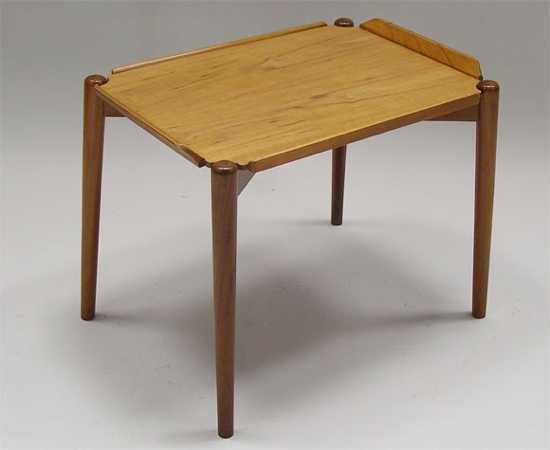
For most households, food was eaten at the dinner table, and nowhere else. But if you were having a party and needed to spread out, there were the ubiquitous table trays. People could eat their piece of birthday cake and drink their glass of lemonade using one of these easy to fold and put together metal table trays. The trays usually had some sort of floral pattern on them, or some festive scene. They usually came six trays to a storage rack. The rack had a handle to carry them around. You could find the rack with the six trays neatly folded and positioned somewhere out of the way, beside the sofa and against the wall. Maybe hidden inside a coat closet. But they were always there. As kids we would set these trays up around the living room, get blankets, drape them over the trays, and use it as a fort. You seldom see these folding table tray sets anymore.
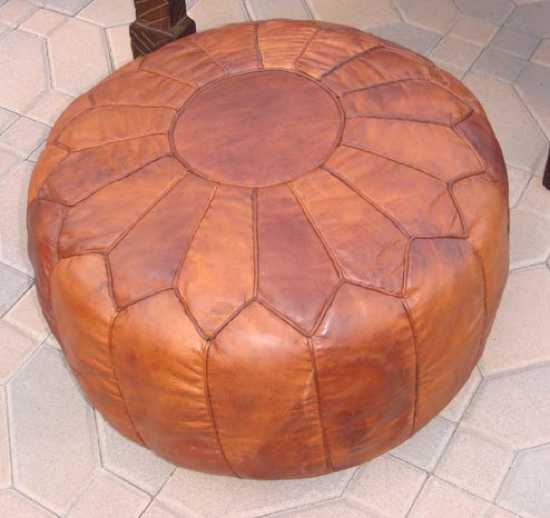
What family living-room or den did not have a hassock (often referred to as a “poof” in non-US English)? Those (usually) round, Naugahyde, vinyl or leather-covered foot rests that no one ever seemed to use to rest their feet on. In fact, in my entire life, I can hardly remember seeing anyone actually using a hassock for the purpose for which it was intended. But they were always there, silent sentinels in their garish colors, guarding the TV set.
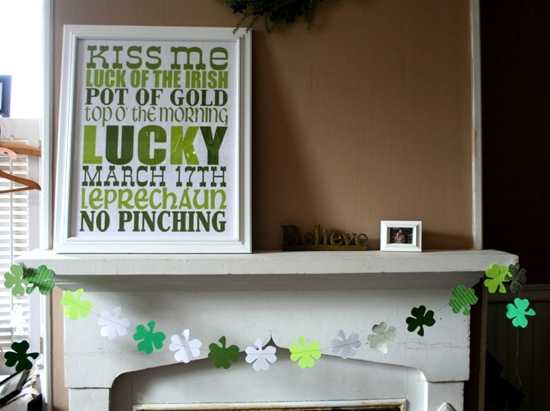
Mothers were really good at placing seasonal decorations around the house. As a kid, you didn’t need to have a calendar or even know what month it was. Just look around the house and mom was on it. Shamrocks and leprechauns hanging on the front door? It was St Patrick’s Day. Cornucopias and pilgrims? Thanksgiving. Eggs and bunny rabbits clinging to the windows? Easter. Mom has a closet somewhere in the house where she kept all this stuff, and she needed a lot of it. Valentines, Fourth of July flags, Halloween ghosts and witches on brooms. And of course, lots of Christmas decorations. People today seem to keep the Christmas decorative spirit alive, and some of the other big ones like Halloween and Easter. But you see less and less of the Lincoln and Washington cut out busts hanging on the door. Only the truly dedicated seasonal decorator was all over Presidents Day. I think that is sad; I think we move too fast and are not as in touch with the changes to the seasons and the various signposts along the way. Valentines into St Patrick’s Day. Easter into Mothers Day. Fourth of July into Halloween. Halloween into Thanksgiving and then Christmas.
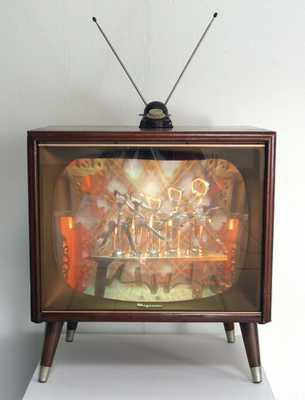
When I was in fourth grade, all the way back in 1968, our teacher told us someday TV sets would hang on the wall like pictures. At a time when few of us even had color TV sets in the house that was kind of hard to imagine. But she was right, it has come to pass that almost all TV sets today hang on the walls. And while these TV sets are fantastic, you seldom see the old TV sets that were made to be another piece of furniture in the house. Decorative sets made of wood that sat on four legs, on the floor, usually in the corner of the living room (with one of mom’s seasonal decorations sitting on top).
And since most people have cable or satellite TV, they also do not have the other staple of TV communication – the rooftop antennae. Setting up, positioning, and repairing the rooftop TV antennae was the suburban equivalent of medieval jousting. All suburban dads had to do it to prove their manhood. There they would be, in all weather, up there on the roof, precariously perched near the electrical and phone wires, trying to get the antennae positioned just right to bring in some far-off TV station they wanted (usually so they could watch a boxing match, football game, or other sporting event). Or more frequently, just to get the damn thing to work. Suburbia and cities used to have a skyline of various size and shapes of TV antennae. Not anymore. Now you have over-sized pizza pans pointed at the sky. And some guy from the satellite company comes and works on it if it needs repaired. Dads are off the hook. Still, the poor reception we get on our TVs when it rains, or when we have a bad cable connection, are far removed from the days of trying to watch a TV show through the snow, static, and rolling picture that used to come as a routine part of antennae sets.
One of the best memories of these old TV sets came several years back when we inherited an old black and white TV from my wife’s grandparents. I brought it home and plugged it in and got my two teenage sons with me to turn it on to see if it still worked. I switched on the set and nothing happened. They immediately gave up, thinking, “that’s it, the set is broke.” I knew better, of course, and told them to wait. About 30 seconds later, after the old vacuum tubes warmed up, the set made that unmistakable sound we all remember TV sets making as they switched on, that sci-fi like noise, and the picture slowly started coming on as a dot in the middle of the screen that slowly got larger and larger. My boys were beside themselves screaming – “TV sets really do that?!” “No way!” “They really do make that noise?!” “You’re kidding?!” “We thought that was made up?!” No, I told them, that was how all TV sets used to start, you turned them on, waited, and hoped.
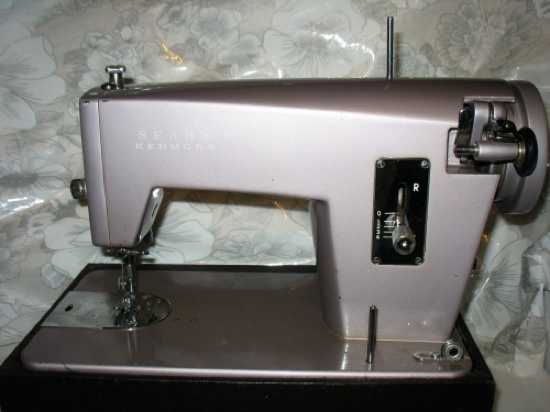
My grandmother had a foot-pump sewing machine, but when I was a kid they were already antiques. Every woman had a sewing machine, usually a Singer model in a case that she could get out of the closet, put on the table, plug in, and sew away. What a fantastic skill to have, to be able to sew. To put patches on our uniforms. To repair torn clothing. To make a new dress from a pattern. It seemed all mothers had that skill when I was a kid and it was commonplace to see the family sewing machine being used. Something else that you seldom see.
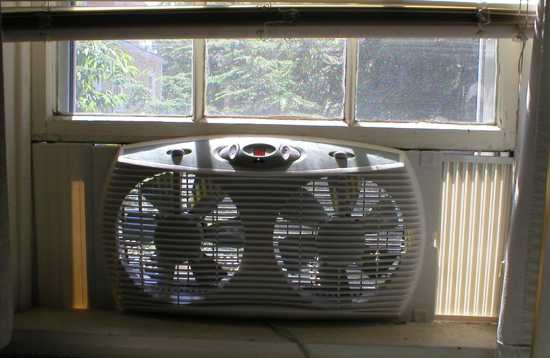
Before everyone had window air-conditioners, and then central air-conditioning, people did one thing in the summer months. They sweat. Summer months, especially July and August, were something that had to be endured. Unless you went to a public place like a movie theater, there was no air-conditioning. If it was 95 and humid outside, your house was even hotter and more uncomfortable. Trying to sleep at night was a real difficulty. The old window fan that rattled away and sucked in slightly less hot air from the outside, during the night, was a staple of all households. Many other rooms had floor fans that you could plug in and circulate the hot humid air around the room at your feet. Or as a kid you could turn it on and lay on the floor with your face in it, feeling the moving air. With central air-conditioning being almost universal now, homes seldom use window or floor fans. Dads around the world no longer have the joy of cramming the window fan into the window, adjusting it, screwing it into place, and then taking it out come fall.
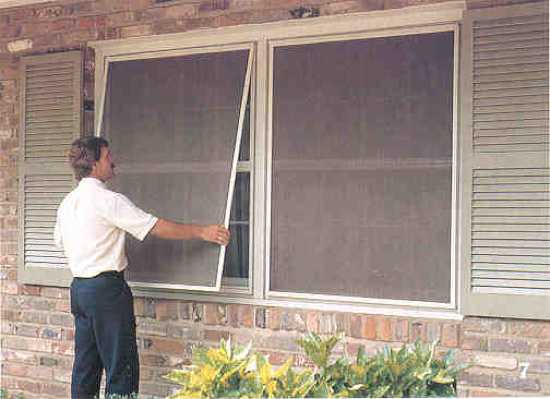
And speaking of dad wrestling with windows, he had another biannual job to do, one even more hated than window fans. Putting in and taking out storm windows and screen windows. Again, in this age of air-conditioning and well fitted, double-panned, thermally insulated year-round windows, no one has to switch between storm windows in the winter and screens in the summer. But back then, this was a necessity. Screen windows had to be installed in the summer so you could let the air in without the bugs. Then at the end of the summer, the screen windows had to come out and the storm windows went back in. These storm windows were pathetic compared to modern windows – heavy, single-pane glass monstrosities that were hard to fit into the window slats and once in, rattled in the strong winter winds (and did a poor job keeping out the cold and wind). But like everything else back then, they were all you had. So they had to do. Thankfully, men don’t need to haul these things around and climb ladders to change windows anymore.

Family wall telephones were in every house back then. There may have also been some pedestal phone sitting on a coffee table or in your sister’s room. But somewhere, usually on the first floor, there was a phone hanging on the wall. Usually it came in the standard color – black. When it rang everyone knew someone was calling. The phone was usually located near some piece of furniture which had a drawer which contained two other disappearing pieces of the family household – the Yellow Pages phone directory, and mom’s little phone message book (that’s right, they had an app. for that even back then – it was called writing down the persons name and phone number in a little A-Z book). The original wall telephones came standard with 4-6 foot cords, so you pretty much had to stand at the phone to talk to whoever it was you were conversing with. Later on they developed 12 and even 18 foot long cords so mom could stretch that receiver over to the stove and keep cooking while she talked. We had one friend who had a mom who stretched their 6-foot cord into an 18-footer. We always joked she invented the extended reach telephone cord. Of course with cell phones, few people even have a phone in the house anymore, and the Yellow Pages may soon be extinct.
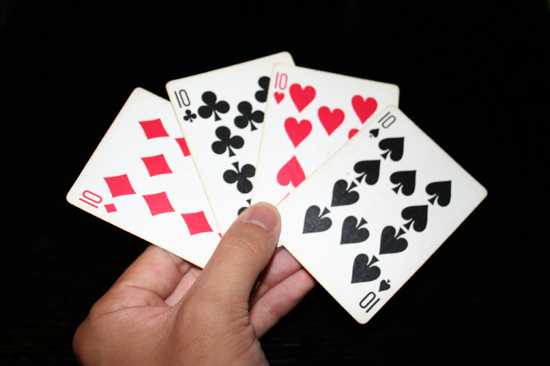
Every house had multiple sets of playing cards. Pinochle, bridge, or straight decks, usually all three. The area I grew up in was huge for pinochle, everyone had pinochle decks. You could walk into any corner store, department store, or convenience store and they sold decks of pinochle cards. Not anymore, pinochle decks are hard to find. They just don’t sell, so the stores stopped carrying them.
Playing cards was a social thing everyone seemed to do. Kids would get out cards and play a game of “war.” Mom would have pinochle or bridge parties and all her friends would come over, dressed to the nines, and mom would bring out all her best glassware. Dad might have some buddies over to drink beer and play poker. Card playing was just part of our lives. Sadly, we are not as social as we used to be, friends don’t just pop in to say hello and a card game spontaneously erupts. Moms don’t have regular card parties. If we play cards, it is on our smart phones or computers. Like that book “Bowling Alone,” we still play cards, just not with other people. How sad.
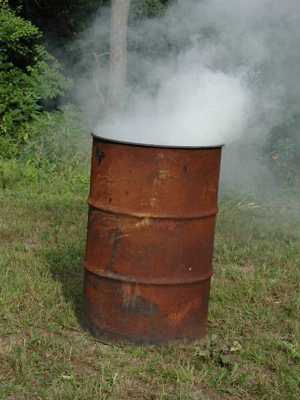
Of all the old household items I miss from my childhood, this is #1. The backyard burn barrel. It was a rusty old empty 55-gallon drum dad brought home from work or found at a junkyard, or God knows where he got it. In the autumn, my favorite time of the year, you knew winter was coming because the geese were flying south, you were playing football, school had started, and the smell of burning leaves was in the air (oh yeah, mom had the Halloween decorations up too). Everyone had one of these in their backyards to burn their fallen leaves. There were no curbside pick-ups to recycle the leaves back then. You just raked them up, and burned them. My mom loved it. She would stand there with an old broom stick handle, blackened at one end, and stir the smoldering leaves to get more air to them so they would combust better. We would rake up the leaves and walk over and dump arm fulls into the burning barrel. Then my mom would stir it like a witch attending her cauldron. There was just nothing like the smell of burning leaves in the autumn, and there still isn’t to this day. Most municipalities and cities banned the burning of leaves decades ago, so it is something you only found in more rural areas. Machines come around and vacuum up your leaves at the curb. Perhaps more environmentally friendly, but we have lost that wonderful seasonal odor as a result.
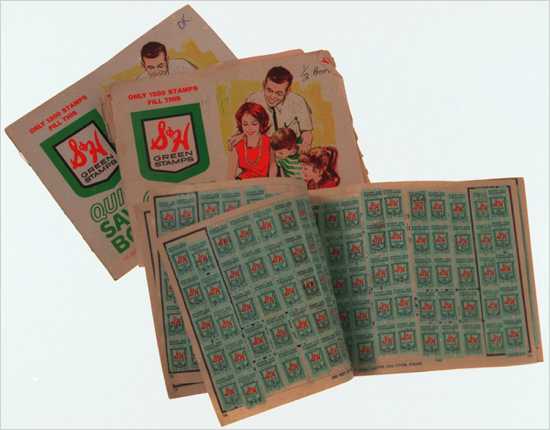
Remember S&H Green Stamps your parents would get when they bought groceries and other stuff? You had those little books and you would save the stamps all year. Then one day your parents would break out the box of stamps and the books and you would all gather at the table and have a green stamp-sticking party. By the end you were down to the little tiny one-cent stamps, trying to fill that last book (and your fingers were green). Then you counted your books and got out the S&H Green Stamp catalog and looked to see what you could redeem your stamps for. Ten books got you a new basketball! Twenty-five books got mom a new frying pan. Thirty-five books got you a new cooler, or the ubiquitous American eagle table lamp. The stuff you were able to get with your S&H Green Stamp books could be found all over the house. This explains why every house in the 1970s had the Bicentennial American eagle table lamps. It also explains why so many houses had #10 and #9.

